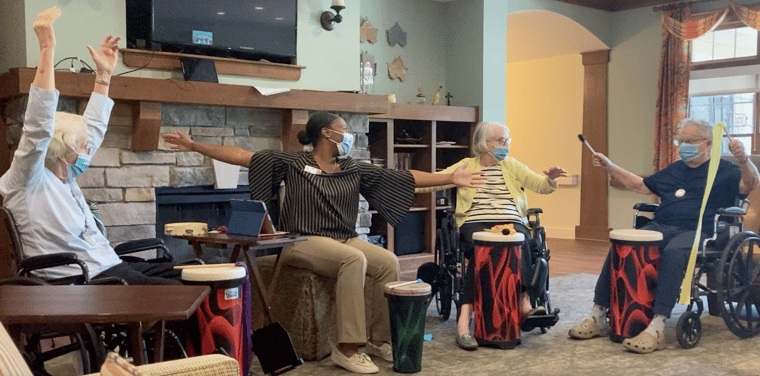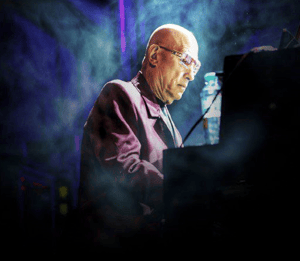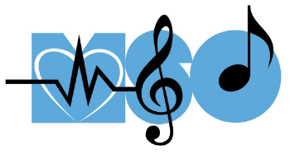
HealthRYTHYMS is a stress-reducing drum circle activity enjoyed by residents at Deupree Cottages and Marjorie P. Lee Retirement Community.
Drumming in a circle for recreation has been scientifically shown to decrease stress, lessen depression and improve employees’ attitudes toward their workplaces, to the point that they’re less likely to seek another employer.
Studies also have found that just one hour a week of drumming for six weeks has improved school performance of at-risk teens, eased work burnout among corporate employees and long-term care workers, and reduced stress indicators in the blood chemistry of coronary heart disease patients.
Music meets science
Arlene de Silva, CEO of the Cincinnati Music & Wellness Coalition, is trumpeting the successes of recreational music making (RMM) as her organization prepares for a Sept. 17 fundraiser called “Physician-Musician: An Experiential Journey through Music & Medicine.”
It will feature a concert by two world-class musicians – Mike Garson, best known as the 30-year piano player for late rock star David Bowie, and violinist Drew Tetrick, who has performed with such artists as Tony Bennett, Andrea Bocelli, and the London Symphony Orchestra.

“The purpose is to get more funds for us so we can keep up with the demand, especially after the pandemic,” de Silva said about the fundraiser. She also wants to create even more demand by letting more people know how many ways RMM helps.
De Silva says RMM – which isn’t music therapy, even though it is therapeutic – can help society in many ways, from potentially reducing suicides to saving companies the money they’d spend to replace employees who found other jobs.
If de Silva had to express what the RMM drum-circle program called HealthRHYTHMS is about in two words, those would be “stress-reduction.”
A concert fundraiser
The Physician-Musician fundraiser will be held Sept. 17 (a Saturday), from 6:30-9:30 p.m. at Christ Church Cathedral in downtown Cincinnati, 318 E. Fourth St. Tickets are $100 and can be purchased at musicandwellness.net or by calling 513-315-7393.
Money raised will train new facilitators; purchase new instruments, and provide programming for non-profit organizations with limited funding.
Episcopal Retirement Services is a sponsor of the benefit and also uses RMM. HealthRHYTHMS facilitator DD Farmer regularly leads drum circles on ERS’ Deupree Cottages campus. They also happen weekly in ERS’ Marjorie P. Lee’s memory-care households.

Speaking during the benefit will be Barry Bittman, a medical doctor, and neurologist and a leader in studying the link between RMM and changes in the body and mind for decades. The University of Cincinnati’s Medical Symphony Orchestra also will play.
Bittman’s studies have linked drumming to factors that lead to better health, such as lower stress, as recorded by psychological surveys and blood tests. He even found that the drumming sessions reversed gene markers that are linked to common diseases in older adults.
Bittman’s peer-reviewed studies also found that RMM improved moods in corporate employees. And for at-risk teens in a court-referred program, another study linked music-making to improved school/work performance, lessened depression and less Adolescent anger.
“We have to continue getting the message out,” de Silva said.
Older Adults’ hands playing the drums
One recent Wednesday in July, DD Farmer, the household coordinator for Deupree Cottages, led a HealthRHYTHMS drum circle, for which de Silva is one of five trainers across the country.
The senior residents played drums however they wished in response to questions from Farmer, such as asking to tell her their names without using their voices – only their drums. They also answered such questions as how their day was going and what they considered to be their best quality.
HealthRHYTHMS is low-stress because there are absolutely no wrong answers or playing styles.
“They do not have to communicate verbally,” Farmer said. “It gives them an option to use the instrument as a way to communicate how they’re feeling, or just to express themselves.”
People with Alzheimer’s disease or other forms of dementia often struggle to find the words they need to express themselves.
“If someone doesn’t feel comfortable with their voice, or just responding to anyone at all, they can just play it out on the drum, and have another way to release some frustration, if they’re having that,” Farmer said.
The drum circles also give the older adults opportunities to reminisce about their musical experiences.
While leading the classes, “I love to see their facial expressions, and just to provide them with another way of having fun,” Farmer said.
“It’s also good for me because I may be having a very stressful day, and I get to bang on the drum and have a way to express myself as well,” she said. “So collectively, it works.”
Farmer has added her creativity to the drum circles: Long, colorful ribbons attached to short sticks that residents can wave, similar to what rhythmic gymnasts do during their routines.
At the end of one July drumming session, after Farmer told her group she hoped to see them next time, the group played their drums excitedly, sounding almost like applause.
“She does a very nice job,” de Silva said about Farmer.
De Silva founded the coalition in 2009 and had conversations with people at UC’s College-Conservatory of Music (CCM) to create a culture of wellness through recreational music-making.
Permission to create rhythms
De Silva says there are three kinds of music-playing:
- Performance-based, someone takes lessons and goes through education programs to improve their musicianship. There’s an element of stress, but also the reward of playing well and a sense of accomplishment.
- There’s also music therapy, which helped former U.S. Rep. Gabby Giffords, R-Arizona, recover from a gunshot to the head during an assassination attempt. Music therapy helps people recover from injuries or illnesses.
- The third type is RMM, such as a garage band that gets together for fun or people singing around the campfire, where nobody criticizes anyone’s performance.
With RMM, instead of helping someone recover from injuries, “this is prevention, this is active music-making,” de Silva said. “And when we give people permission to do that creative musical expression, something happens.”
“You don’t have to be a musician” to participate, she said. “You don’t have to know anything about music to participate or even become a facilitator.”
De Silva said Bittman believes that “when you give people permission to create, they create rhythms, and there are changes that happen at the biological level.”
Striking away stress
After tests Bittman performed on people who drummed one hour a week for six weeks, “The results were amazing: a 46-percent mood change, whether it’s depression, anger, anxiety,” de Silva said.
“He was looking at the mood changes, the blood pressure that went down,” she said. “And it wasn’t just one research study. He’s done seven studies on different populations.”
“I tell the coalition members: Don’t just think of this for the (senior-resident) populations you’re serving. Think of your staff.”
Bittman studied RMM with long-term care workers years before the COVID-19 pandemic and found it relieved heavy stress levels they were feeling.
“Think of what it would show us now, where people are today,” de Silva said.
One of Bittman’s studies, reported in 2003 and conducted in concert with economic consultants, estimated that HealthRHYTHMS sessions could reduce employee turnover by 18 percent, saving a typical 100-bed senior-care facility about $89,000 per year in employee-replacement costs. Those savings represented $60.57 per dollar spent.
More information about the Sept. 17 benefit, Physician Musician: An Experiential Journey through Music and Medicine, can be found here: https://musicandwellness.net/physician-musician/
Care and therapies for your loved one
Majorie P. Lee has the tools and ability to provide the care and therapies that your loved one needs to adequately function and even thrive with a life-changing condition such as dementia. Download our guide to learn more about dementia and how to get started on your journey to optimum care.












